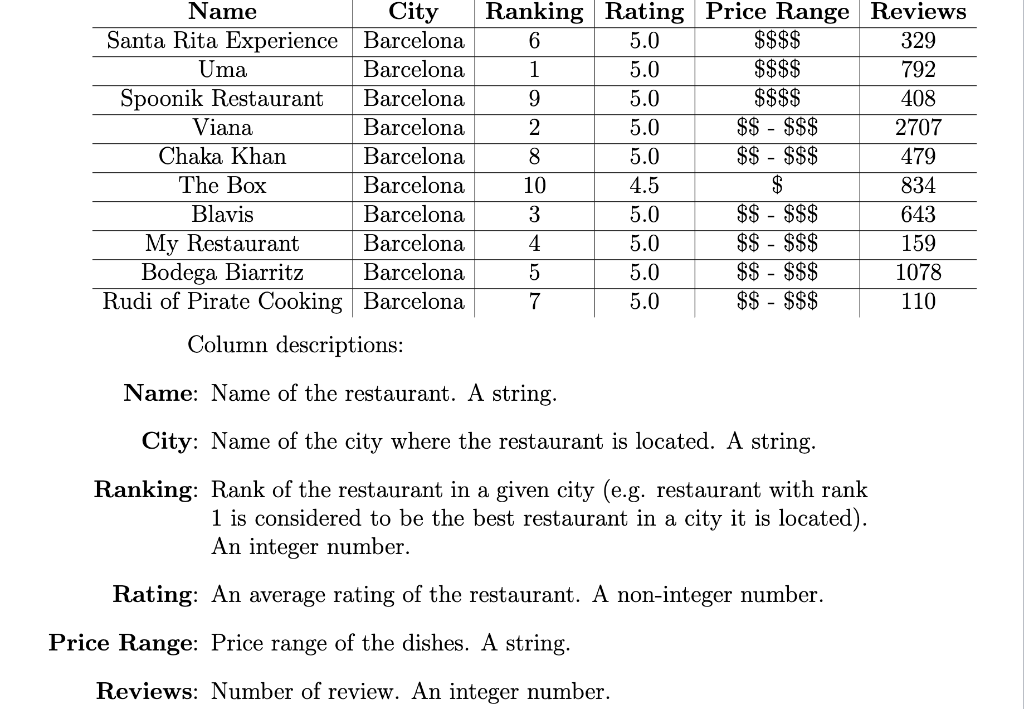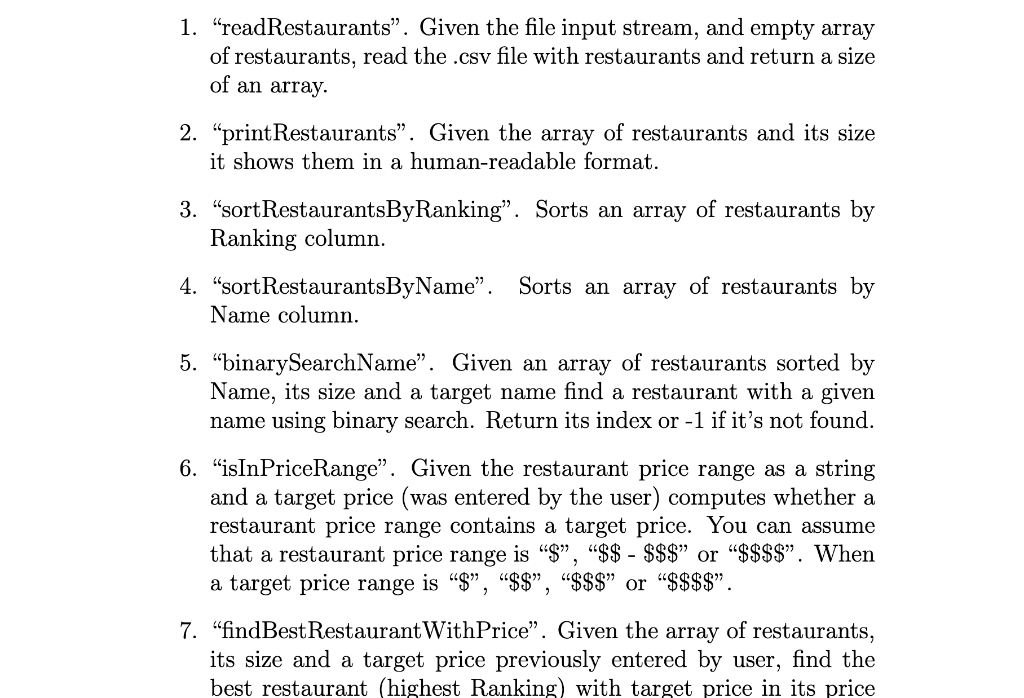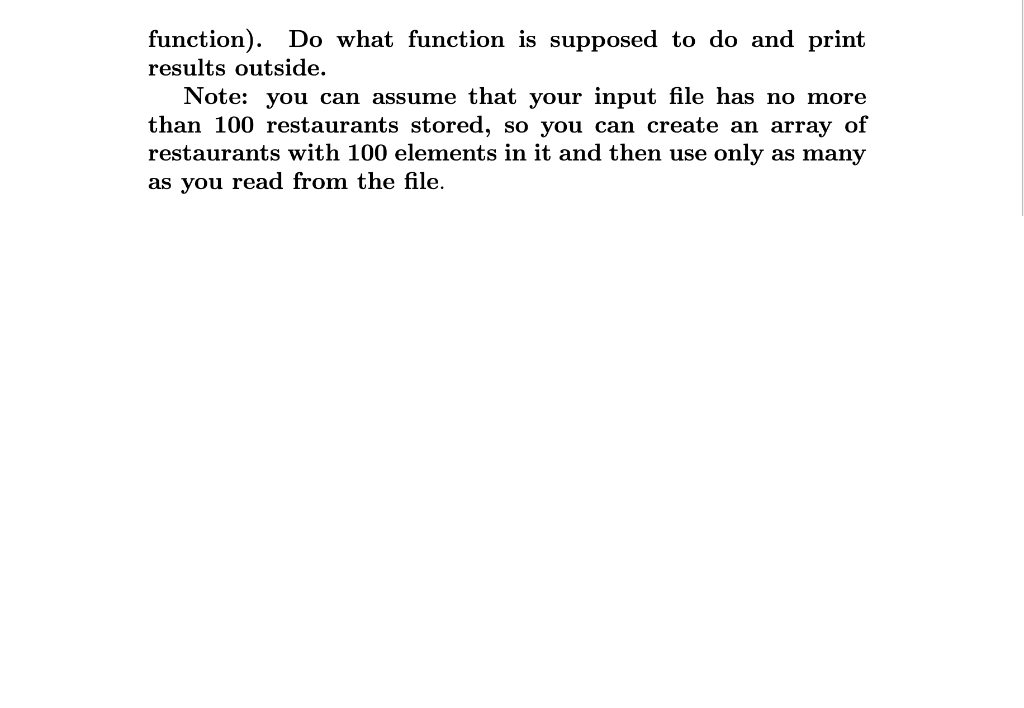Question: #include #include #include #include #include using namespace std; struct Restaurant { string Name, City, Price_range; double Rating; int Ranking, Review; }; int readRestaurants(ifstream& in, Restaurant


![in, Restaurant restaurants[]); void printRestaurants(Restaurant restaurants[],string columns[] , int SIZE); void sortRestaurantsByRanking(Restaurant](https://s3.amazonaws.com/si.experts.images/answers/2024/08/66adf25cb1acd_80466adf25c373fc.jpg)
![restaurants[], int SIZE); void sortRestaurantsByName(Restaurant restaurants[], int SIZE); int binarySearchName(Restaurant restaurants[], int](https://s3.amazonaws.com/si.experts.images/answers/2024/08/66adf25d6ae4c_80466adf25ceb033.jpg)
![SIZE, string name); bool isInPriceRange(string priceRange, string targetPrice); int findBestRestaurantWithPrice(Restaurant restaurants[], int](https://s3.amazonaws.com/si.experts.images/answers/2024/08/66adf25e09c17_80566adf25da3a54.jpg)

![compareRestByRank(Restaurant r1,Restaurant r2) { return r1.Ranking } int readRestaurants(ifstream &in, Restaurant restaurants[])](https://s3.amazonaws.com/si.experts.images/answers/2024/08/66adf25f61630_80666adf25edc51f.jpg)

#include
#include
#include
#include
#include
using namespace std;
struct Restaurant
{
string Name,
City,
Price_range;
double Rating;
int Ranking,
Review;
};
int readRestaurants(ifstream& in, Restaurant restaurants[]);
void printRestaurants(Restaurant restaurants[],string columns[] , int SIZE);
void sortRestaurantsByRanking(Restaurant restaurants[], int SIZE);
void sortRestaurantsByName(Restaurant restaurants[], int SIZE);
int binarySearchName(Restaurant restaurants[], int SIZE, string name);
bool isInPriceRange(string priceRange, string targetPrice);
int findBestRestaurantWithPrice(Restaurant restaurants[], int SIZE, string targetPrice);
bool compareRestByName(Restaurant r1,Restaurant r2)
{
return r1.Name
}
bool compareRestByRank(Restaurant r1,Restaurant r2)
{
return r1.Ranking
}
int readRestaurants(ifstream &in, Restaurant restaurants[])
{
string line;
int i = 0,
j = 0;
while(getline(in,line))
{
stringstream ss(line);
string word;
j = 0;
while(getline(ss, word, ','))
{
if(j == 0)
{
restaurants[i].Name = word;
j++;
}
else if (j==1)
{
restaurants[i].City = word;
j++;
}
else if (j==2)
{
restaurants[i].Ranking = stoi(word);
j++;
}
else if (j==3)
{
restaurants[i].Rating = stoi(word);
j++;
}
else if(j==4)
{
restaurants[i].Price_range = word;
j++;
}
else if(j==5)
{
restaurants[i].Review = stoi(word);
j=0;
}
}
i++;
}
return i;
}
void printRestaurants(Restaurant restaurants[],string columns[6],int SIZE)
{
cout
cout
for(int i=0 ; i
{
cout
cout
}
}
void sortRestaurantsByRanking(Restaurant restaurants[],int SIZE)
{
bool swapped = false;
do
{
swapped = false;
for(int i = 0; i
{
if(restaurants[i].Ranking > restaurants[i+1].Ranking)
{
swap(restaurants[i], restaurants[i+1]);
swapped = true;
}
}
} while (swapped);
}
void sortRestaurantsByName(Restaurant restaurants[],int SIZE)
{
bool swapped = false;
do
{
swapped = false;
for(int i = 0; i
{
if(restaurants[i].Name > restaurants[i+1].Name)
{
swap(restaurants[i], restaurants[i+1]);
swapped = true;
}
}
} while (swapped);
}
int binarySearchName(Restaurant restaurants[],int SIZE,string R_Name)
{
sortRestaurantsByName(restaurants,SIZE);
int mid,
low = 0,
high = SIZE-1;
while(low
{
mid = low + ( high - low ) / 2;
if(restaurants[mid].Name == R_Name)
{
return mid;
}
else if(restaurants[mid].Name > R_Name)
{
high = mid - 1;
}
else
low = mid + 1;
}
return -1;
}
bool isInPriceRange(string PriceRange,string TargetPrice)
{
if(PriceRange == "$$-$$$")
{
if(TargetPrice == "$$" || TargetPrice == "$$$")
return true;
else
return false;
}
else
{
if(PriceRange == "$$$$" && TargetPrice == "$$$$")
return true;
else if(PriceRange == "$" && TargetPrice == "$")
return true;
else
return false;
}
}
int findBestRestaurantWithPrice(Restaurant restaurants[],string TargetPrice,int SIZE)
{
sortRestaurantsByRanking(restaurants,SIZE);
for(int i = 0; i
{
if(isInPriceRange(restaurants[i].Price_range,TargetPrice) == true)
return i;
}
return -1;
}
int main()
{
Restaurant restaurants[100];
ifstream in("restaurants.csv");
if (!in)
{
cout
return 0;
}
string columns[6],
R_Name,
TPrice;
int SIZE = readRestaurants(in, restaurants);
int opt,
index;
do
{
cout
cin >> opt;
switch(opt)
{
case 1 : sortRestaurantsByName(restaurants,SIZE);
printRestaurants(restaurants,columns,SIZE);
break;
case 2 : sortRestaurantsByRanking(restaurants,SIZE);
printRestaurants(restaurants,columns,SIZE);
break;
case 3 : cout
cin >> R_Name;
index = binarySearchName(restaurants,SIZE,R_Name);
if(index != -1)
//cout
printRestaurants(restaurants,columns,index);
else
cout
break;
case 4 : cout
cin >> TPrice;
index = findBestRestaurantWithPrice(restaurants,TPrice,SIZE);
if(index != -1)
//cout
printRestaurants(restaurants,columns,index);
else
cout
break;
case 5 : cout
in.close();
return 0;
break;
default :
break;
}
} while(true);
in.close();
return 0;
}
Having error: libc++abi.dylib: terminating with uncaught exception of type std::invalid_argument: stoi: no conversion
csv file: restaurants.csv
Name,City,Ranking,Rating,Price Range,Number of Reviews
Uma,Barcelona,1,5.0,$$$$,792
Viana,Barcelona,2,5.0,$$ - $$$,2707
Blavis,Barcelona,3,5.0,$$ - $$$,643
My Restaurant,Barcelona,4,5.0,$$ - $$$,159
Bodega Biarritz,Barcelona,5,5.0,$$ - $$$,1078
Santa Rita Experience,Barcelona,6,5.0,$$$$,329
Rudi of Pirate Cooking,Barcelona,7,5.0,$$ - $$$,110
Chaka Khan,Barcelona,8,5.0,$$ - $$$,479
Spoonik Restaurant,Barcelona,9,5.0,$$$$,408
The Box,Barcelona,10,4.5,$,834
Problem description Today you'll be working as a Trip Advisor software engineer. You'll help a user of your application to find a place to eat in Barcelona. The user is interested in restaurants sorted by (1) Name and (2) Ranking. Also, he/she wants to (3) find restaurants by a Name and (4) get the best restaurant with a given prices. You'll be given a ".csv" file in the following format: 5.0 Name City Santa Rita Experience Barcelona Uma Barcelona Spoonik Restaurant Barcelona Viana Barcelona Chaka Khan Barcelona The Box Barcelona Blavis Barcelona My Restaurant Barcelona Bodega Biarritz Barcelona Rudi of Pirate Cooking Barcelona Ranking Rating Price Range Reviews 6 $$$$ 329 5.0 $$$$ 792 5.0 $$$$ 408 5.0 $$ - $$$ 2707 8 $$ - $$$ 479 4.5 834 5.0 $$ - $$$ 643 5.0 $$ - $$$ 159 5.0 $$ - $$$ 1078 5.0 $$ - $$$ 110 5.0 Column descriptions: Name: Name of the restaurant. A string. City: Name of the city where the restaurant is located. A string. Ranking: Rank of the restaurant in a given city (e.g. restaurant with rank 1 is considered to be the best restaurant in a city it is located). An integer number. Rating: An average rating of the restaurant. A non-integer number. Price Range: Price range of the dishes. A string. Reviews: Number of review. An integer number. Reviews: Number of review. An integer number. This is a part of a database that you can find here. The database is stored in a CSV (comma-separated values) file. It's a file format used to store tabular data. Rows are separated with an endline symbol and individual values are separated by comma. Note, values stored cannot contain comma or endline symbol. Note, that unlike "flights.csv" from the previous assignment this file has col- umn names as a first row. Column names are always in the same See "restaurants.csv" for an example. Implementation The program should run in a while loop. Each iteration the program should ask to enter the menu option (1-5). Depending on the menu option the program should do the following: 1. Show all the restaurants in a database in a human readable for- mat sorted by a Name column. 2. Show all the restaurants in a database in a human readable for- mat sorted by a Ranking column. 3. Find restaurant by a Name using a binary search. 4. Read a price range then find the restaurant with the highest Ranking that has a given price range. For example, if the user inputs "$$" you should find restaurant with a name "Viana. The result will be the same if user enters "$$$". In another words, "$$ - $$$ means that restaurant has dishes with prices "$$" and "$$$. Note, that it is the highest ranking restaurant with price range $$ for city Barcelona. But it should work for other cities as well (".csv" files with a different content). 5. Exit the loop. The program should contain at least 7 functions (excluding main). 1. "readRestaurants". Given the file input stream, and empty array of restaurants, read the .csv file with restaurants and return a size of an array 2. "printRestaurants. Given the array of restaurants and its size it shows them in a human-readable format. 3. sort RestaurantsByRanking. Sorts an array of restaurants by Ranking column. 4. sort RestaurantsByName". Sorts an array of restaurants by Name column. 5. "binary SearchName". Given an array of restaurants sorted by Name, its size and a target name find a restaurant with a given name using binary search. Return its index or -1 if it's not found. 6. "isInPriceRange". Given the restaurant price range as a string and a target price (was entered by the user) computes whether a restaurant price range contains a target price. You can assume that a restaurant price range is "$", "$$ - $$$" or "$$$$". When a target price range is "$", "$$", "$$$" or "$$$$. 7. "find Best Restaurant WithPrice". Given the array of restaurants, its size and a target price previously entered by user, find the best restaurant (highest Ranking) with target price in its price range. Return the index of a the found restaurant or -1 if there are no restaurant with a target price. The easiest way to do it is to do a linear search in the array of restaurants sorted by Ranking. Note, you should use isInPriceRange" inside this function. IMPORTANT: don't use cin or cout inside functions that doesn't have read or print in a name (except for main() function). Do what function is supposed to do and print results outside. Note: you can assume that your input file has no more than 100 restaurants stored, so you can create an array of restaurants with 100 elements in it and then use only as many as you read from the file. Problem description Today you'll be working as a Trip Advisor software engineer. You'll help a user of your application to find a place to eat in Barcelona. The user is interested in restaurants sorted by (1) Name and (2) Ranking. Also, he/she wants to (3) find restaurants by a Name and (4) get the best restaurant with a given prices. You'll be given a ".csv" file in the following format: 5.0 Name City Santa Rita Experience Barcelona Uma Barcelona Spoonik Restaurant Barcelona Viana Barcelona Chaka Khan Barcelona The Box Barcelona Blavis Barcelona My Restaurant Barcelona Bodega Biarritz Barcelona Rudi of Pirate Cooking Barcelona Ranking Rating Price Range Reviews 6 $$$$ 329 5.0 $$$$ 792 5.0 $$$$ 408 5.0 $$ - $$$ 2707 8 $$ - $$$ 479 4.5 834 5.0 $$ - $$$ 643 5.0 $$ - $$$ 159 5.0 $$ - $$$ 1078 5.0 $$ - $$$ 110 5.0 Column descriptions: Name: Name of the restaurant. A string. City: Name of the city where the restaurant is located. A string. Ranking: Rank of the restaurant in a given city (e.g. restaurant with rank 1 is considered to be the best restaurant in a city it is located). An integer number. Rating: An average rating of the restaurant. A non-integer number. Price Range: Price range of the dishes. A string. Reviews: Number of review. An integer number. Reviews: Number of review. An integer number. This is a part of a database that you can find here. The database is stored in a CSV (comma-separated values) file. It's a file format used to store tabular data. Rows are separated with an endline symbol and individual values are separated by comma. Note, values stored cannot contain comma or endline symbol. Note, that unlike "flights.csv" from the previous assignment this file has col- umn names as a first row. Column names are always in the same See "restaurants.csv" for an example. Implementation The program should run in a while loop. Each iteration the program should ask to enter the menu option (1-5). Depending on the menu option the program should do the following: 1. Show all the restaurants in a database in a human readable for- mat sorted by a Name column. 2. Show all the restaurants in a database in a human readable for- mat sorted by a Ranking column. 3. Find restaurant by a Name using a binary search. 4. Read a price range then find the restaurant with the highest Ranking that has a given price range. For example, if the user inputs "$$" you should find restaurant with a name "Viana. The result will be the same if user enters "$$$". In another words, "$$ - $$$ means that restaurant has dishes with prices "$$" and "$$$. Note, that it is the highest ranking restaurant with price range $$ for city Barcelona. But it should work for other cities as well (".csv" files with a different content). 5. Exit the loop. The program should contain at least 7 functions (excluding main). 1. "readRestaurants". Given the file input stream, and empty array of restaurants, read the .csv file with restaurants and return a size of an array 2. "printRestaurants. Given the array of restaurants and its size it shows them in a human-readable format. 3. sort RestaurantsByRanking. Sorts an array of restaurants by Ranking column. 4. sort RestaurantsByName". Sorts an array of restaurants by Name column. 5. "binary SearchName". Given an array of restaurants sorted by Name, its size and a target name find a restaurant with a given name using binary search. Return its index or -1 if it's not found. 6. "isInPriceRange". Given the restaurant price range as a string and a target price (was entered by the user) computes whether a restaurant price range contains a target price. You can assume that a restaurant price range is "$", "$$ - $$$" or "$$$$". When a target price range is "$", "$$", "$$$" or "$$$$. 7. "find Best Restaurant WithPrice". Given the array of restaurants, its size and a target price previously entered by user, find the best restaurant (highest Ranking) with target price in its price range. Return the index of a the found restaurant or -1 if there are no restaurant with a target price. The easiest way to do it is to do a linear search in the array of restaurants sorted by Ranking. Note, you should use isInPriceRange" inside this function. IMPORTANT: don't use cin or cout inside functions that doesn't have read or print in a name (except for main() function). Do what function is supposed to do and print results outside. Note: you can assume that your input file has no more than 100 restaurants stored, so you can create an array of restaurants with 100 elements in it and then use only as many as you read from the file
Step by Step Solution
There are 3 Steps involved in it

Get step-by-step solutions from verified subject matter experts


